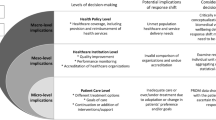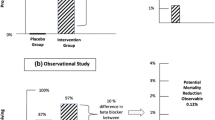Abstract
Due to their potential as helpful clinical tools, it is necessary to understand the reasons why certain practitioners are currently using outcome measures and certain others are not. This study investigated the reasons why clinicians use outcome measures based upon factors such as work setting, theoretical orientation and source of payment. Similar analyses were conducted for reasons that clinicians do not use outcome measures. Findings suggest that several practical barriers are the primary reasons for not using outcome measures, although a subset of clinicians have additional concerns. Results also emphasized the need for clinicians to be trained on how to maximize the clinical benefits of formalized outcome assessment.
Similar content being viewed by others
References
Barkham, M., Margison, F., Leach, C., Lucock, M., Mellor-Clark, J., Evans, C., Benson, L., Connell, J., Audin, K., & McGrath, G. (2001). Service profiling and outcomes benchmarking using the CORE-OM: Toward practice-based evidence in the psychological therapies. Journal of Consulting and Clinical Psychology, 69(2), 184–196.
Bickman, L., Rosof-Williams, J., Salzer, M. S., Summerfelt, W. T., Noser, K., Wilson, S. J., & Karver, M. S. (2000). What information do clinicians value for monitoring adolescent client progress and outcomes? Professional Psychology: Research and Practice, 31, 70–74.
Dawes, R. M. (1996). House of cards: Psychology and psychotherapy built on myth. New York, NY: Free Press.
Garland, A. F., Kruse, M., & Aarons, G. A. (2003). Clinicians and outcome measurement: What’s the use? Journal of Behavioral Health Services and Research, 30(4), 393–405.
Hannan, C., Lambert, M., Harmon, C., Nielson, S., Smart, D., Shimokawa, K., & Sutton, S. (2005). A lab test and algorithms for identifying clients at risk for treatment failure. Journal of Clinical Psychology, 61(2), 155–163.
Hatfield, D. R., & Ogles, B. M. (2004). The use of outcome measures by psychologists in clinical practice. Professional Psychology: Research and Practice, 35, 485–491.
Hatfield, D. R. & Ogles, B. M. (2006). The influence of outcome measures in assessing client change and treatment decisions. Journal of Clinical Psychology, 62(3), 325–337.
Kordy, H., Hannöver, W., & Richard, M. (2001). Computer-assisted feedback-driven quality management for psychotherapy: The Struttgart–Heidelberg Model. Journal of Consulting and Clinical Psychology, 69(2), 173–183.
Lambert, M. J. (2001). Psychotherapy outcome and quality improvement: Introduction to the special section on patient-focused research.Journal of Consulting and Clinical Psychology, 69(2), 147–149.
Lambert, M., Harmon, C., Slade, K., Whipple, J., & Hawkins, E. (2005). Providing feedback to psychotherapists on their patients’ progress: Clinical results and practice suggestions. Journal of Clinical Psychology,61(2), 165–174.
Lambert, M. J., Whipple, J. L., Smart, D. W., Vermeersch, D. A., Nielsen, S. L., & Hawkins, E. J. (2001). The effects of providing therapists with feedback on patient progress during psychotherapy: Are outcomes enhanced? Psychotherapy Research, 11(1), 49–68.
Lambert, M. J., Whipple, J. L., Vermeersch, D. A., Smart, D. W., Hawkins, E. J., Nielson, S. L., et al. (2002). Enhancing psychotherapy outcomes via providing feedback on client treatment response: A replication. Clinical Psychology and Psychotherapy, 9, 91–109.
Lueger, R. J., Howard, K. I., Martinovich, Z., Lutz, W., Anderson, E. E., & Grissom, G. (2001). Assessing treatment progress of individual patients using expected treatment response models. Journal of Consulting and Clinical Psychology, 69(2), 150–158.
Meehl, P. E. (1996). Clinical versus statistical prediction: A theoretical analysis and a review of the evidence (New Preface). Lanham, MD: Rowan and Littlefield/Jason Aronson.
Phelps, R., Eisman, E. J., & Kohout, J. (1998). Psychological practice and managed care: Results of the CAPP practitioner survey. Professional Psychology: Research and Practice, 29, 31–36.
Whipple, J. L., Lambert, M. J., Vermeersch, D. A., Smart, D. W., Nielsen, S. L., & Hawkins, E. J. (2003). Improving the effects of psychotherapy: The use of early identification of treatment and problem-solving strategies in routine practice Journal of Counseling Psychology, 50(1), 59–68.
Author information
Authors and Affiliations
Corresponding author
Rights and permissions
About this article
Cite this article
Hatfield, D.R., Ogles, B.M. Why Some Clinicians Use Outcome Measures and Others Do Not. Adm Policy Ment Health 34, 283–291 (2007). https://doi.org/10.1007/s10488-006-0110-y
Received:
Accepted:
Published:
Issue Date:
DOI: https://doi.org/10.1007/s10488-006-0110-y




